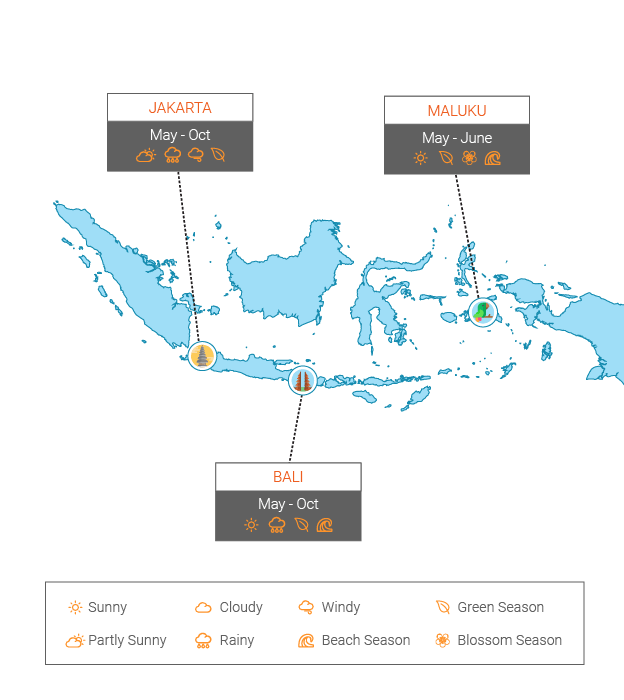Indonesia Travel Information
Geographically and politically speaking, Indonesia is a country. But culturally and spiritually speaking, Indonesia is like an entire continent. This unlikely nation – the world’s 4thmost populous – consists of thousands of islands, hundreds of languages, and tens of religions. Indonesia is a cultural goldmine, a culinary mosaic, and an unrivalled natural beauty.
Bali has been an Indonesia vacation highlight for decades, from the rocking beaches of Kuta to the peaceful and culture orientated Ubud. Java is the country’s most varied island, with the world’s largest ancient Buddhist temple at Borobudur and country’s most charming ancient city, the sultanate of Yogyakarta. Sumatra is an island for adventurers, as you can observe Orangutans swinging from the trees in the jungles around Bukit Lawang or hike up the active volcanoes surrounding Berastagi.
POPULAR HOLIDAYS TO INDONESIA
Indonesia Secret Escape
Java & Bali Journey to the Other World
INDONESIA WEATHER AND WHEN TO GO

JAVA (Jakarta & Northwestern areas) & BALI (Bali & Nusa Islands)
- Rain season (Nov – Apr): The temperature remains at around from 30°C. In the first two months, the islands are covered with brief and tropical rainfalls during daytime. Midst season, there might be heavy downpours and floods at coastal areas.
- Dry season (May – Oct): The temperature ranges from 25 – 35°C in a day with high humidity, dry wind and balanced sea level. At rural areas, there might be droughts in June and July.
MALUKU (Southern & Eastern areas)
- Rain season (Jun – Sep in the South, Nov – Apr in the North): Rain season in Maluku is remarkably different from other regions. Overall, at the first two months in both areas, the temperature remains at 30°C with infrequent, brief rainfalls. Midst season, the atmosphere becomes extremely humid, followed by strong wind and eventually daily downpours.
- Dry season (May – Nov in the South, Dec – Mar in the North): Despite differences in the time beings, the season in both Maluku’s areas share common characteristics of long sunny day, dry wind, brilliant clear sky and balanced water level.
THINGS TO SEE IN INDONESIA
FAQs ABOUT INDONESIA
- Visitors from most countries travelling to Indonesia may apply for a visa in advance or visa on arrival.
- The visa on arrival is valid for 30 days and available for over 60 countries, at major airports or harbors (but not most land borders). Upon arrival, you should carry a valid passport (must-have), flight tickets, portrait photos and hotel vouchers (if any) to fill in the legal documents. Afterwards, if you wish to stay longer, you should visit the nearest immigration post for visa extension.
- Typically, visa in advance is valid for 60 days with details vary by country and the only way to obtain a 60-day visitor visa even if you are on the visa exemption You should contact your nearest Indonesian embassy or consulate to determine the application process as well as fees and times.
- For further details, please visit Ministry of Foreign Affairs, Republic of Indonesia or contact our journey planners.
- Luxury 5* – 6*: The luxury stays in Indonesia, ranging from US $350 – $600, are rather expensive in comparison to neighbouring countries due to the location diversity. Despite the isolated distances among islands, the deluxe services and international standard quality for example as of JW Marriot Bali or TS Suites are not much different between retreats.
- Deluxe 4*: Hotels and resorts in this category are the best values, with price range from US $150 – $300. The stays are usually decorated simple, some single platforms, tropical style but under excellent services and amenities.
- Comfort Boutique 3*: The hotels in this standard range from US $60 – $100 with basic facilities and fine comforts. However, at remote areas, the services are under some limitations due to rough locations and long approach.
- Homestay: At an attractive rate of under US $60, you may find a simple local home with minimal comforts and oriented food in Indonesia’s remote areas. This is a stunning option for those who are longing to get close with the country’s traditions and local cultures.
- Ojek: Ojeks (or ojegs) are motorcycle riders who take pillion passengers for a negotiated price. They are found at bus terminals and markets, or just hanging around at crossroads. They will take you around town and go where no other public transport exists, or along roads that are impassable in any other vehicle.
- Bus: Large buses are not used much as a means of city transport except on Java (although there is a small system on Bali). There is an extensive system of buses in Jakarta and these are universally cheap, but beware of pickpockets.
- Taxi: Metered taxis are readily available in major cities. If a taxi has a meter, make sure it is used. Where meters do not exist, you will have to bargain for the fare in advance. Offers of ‘transport’ are almost always more costly than using a metered taxi.
- Becak: These are three wheeled carts, either peddle or motor-powered. The becak is now banned from the main streets of some large cities, but you’ll still see them swarming the back streets, moving anyone and anything.
- Domestic flights: While there are ferries between Indonesia’s main islands, flying is almost always the faster and more reliable way to cover distances of any note. But be aware that as firm as ticketed itineraries may seem, plane schedules, particularly on smaller airlines and to less visited destinations can be unreliable and infrequent. Internal carriers include: Air Asia, Lion Air, Garuda, Merpati.
- Rice is an important part of the national diet for most of the archipelago, but in the eastern islands, corn, sago, cassava and sweet potatoes are more common.
- The enormous wealth of the surrounding sea, as well as fresh water fisheries, provides an abundance of sea food which can be traditionally served in a number of exciting ways, including baked in banana leaves.
- As the population of Indonesia is predominantly Muslim, pork is usually not served with the exceptions of Chinese, international restaurants, and non-Muslim regions such as Bali and Papua.
- An extensive assortment of tropical and sub-tropical fruit and vegetables can be found year round to tantalize your taste buds.
- Most water that comes out of taps in Indonesia has had very little treatment, and can contain a whole range of bacteria and viruses. Drink only bottled, boiled or sterilized water.
- Indonesian coffee is among the best in the world, and drunk with copious amounts of sugar and, occasionally, condensed milk.
- Alcohol can be a touchy subject in parts of Indonesia, where public drunkenness may incur serious trouble. There’s no need to be paranoid about this in cities, however, and the locally produced beers, Anker and Bintang Pilsners are good, and widely available at Chinese restaurants and bigger hotels.
When traveling in Indonesia, you should avoid mosquito bites to prevent malaria. You may need to take prescription medicine before, during, and after your trip to prevent malaria, depending on your travel plans, such as where you are going, when you are traveling, and if you are spending a lot of time outdoors or sleeping outside. Talk to your doctor about how you can prevent malaria while traveling.
Rabies can be found in dogs, bats, and other mammals in Indonesia, so we recommend this vaccine for the following groups:
- Travelers involved in outdoor and other activities that put them at risk for animal bites.
- People who will be working with or around animals.
- People who are taking long trips or moving to Indonesia.
- Children, because they tend to play with animals, might not report bites, and are more likely to have animal bites on their head and neck.
- Driving at any time of day can be risky in Indonesia, but is it especially dangerous at night. Poorly lit areas, little use of headlights, and unexpected objects on the road are just a few of the obstacles you’ll encounter. Use extreme caution and avoid driving when it is unnecessary.
- You should never engage in drug use in Indonesia. The penalties are severe for anyone found to be in possession, using, or trafficking drugs. Regardless of your U.S. citizenship, you will be subject to Indonesian law and penalties, which can include death.
DOs:
- Wear a Sarong or long clothes when entering a temple.
- Use both hands when giving or receiving as a compliment.
- Wave with your palm facing down using entire hands, palms down.
- Bring water bottles alongside whenever you join outdoor wandering.
- Enjoy an ice cold Bintang, Balis’ No. 1 beer and it comes in large bottles!
- Take off your shoes when entering a home, temple or pagoda (take a look around).
- Wear a helmet when driving a scooter (Insider tip: Wearing an “udeng” (The traditional Balinese headwear exempts you from wearing a helmet).
DON’Ts:
- Enter a temple during menstruating (if you have an open wound you should not enter).
- Hand over something with your left hand as it is considered impolite.
- Point with your index finger as it is considered offensive.
- Touch people’s heads, even the kids’.
- Do drugs. Indonesian laws are strict.
- Touch or point at someone with feet.
- Drink tap water.
Sens Asia Travel provides travelers with advanced, licensed tour services and curated options for accommodations as well as tour activities, which are regularly inspected & verified by our local experts.
We have our representative offices in Asia (Vietnam, Myanmar, Laos) as well as in European (Germany) which allow our team to coordinate well on the ground and react quickly if there should be any problems.
We have 100% positive feedback rate from customers since the day of launching. In addition, we have been featured on various trusted media platforms and publications.
As we get favorable rates from hotels and accommodation partners, the total cost you pay will be more reasonable or just marginally a bit more expensive than if you booked directly yourself.
We have supportive local journey planners, who have been living or traveling extensively throughout Southeast Asia regions as they may help you create your own trip to match your schedule & choices of activities, accommodations and pace.
A journey planner will work with all the details you provide and create the best options to suit what you are looking for. Within 24 to 48 working hours, you will receive details for travel itinerary options and quotation. These suggestions can be tweaked and changed until you are fully satisfied.
Upon confirmation, you will only need to make a deposit payment of 30% of the total trip cost for your journey planner to start making reservation of hotels, tour guides & other services.
A personal journey planner will take care of all the details for you from the start of creating the trip until your vacation is finished and you are safely back home.
